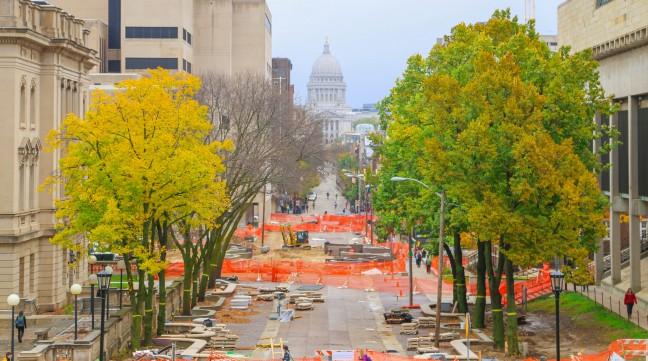University students throughout the past year-and-a-half have experienced additional pressures and stresses due to the COVID-19 pandemic, specifically in regards to choosing a major, graduate programs and research.
Students at the University of Wisconsin are required to declare a major no later than the end of the semester in which the student accumulates 86 credits, according to the Undergraduate Major Declaration policy.
UW offers 125 majors in eight undergraduate schools and colleges, according to the Office of Admissions and Recruitment. The course prerequisites, GPA requirements and application procedures and deadlines vary depending on the school.
For example, according to the College of Letters & Science website, undergraduate students admitted to UW are able, without further application, to claim the College of Letters & Science as their college. Students interested in business must apply separately to the School of Business with risk of not getting in.
UW Sophomore Simon Bushmaker, who was undecided on his major until recently, said he believes students lack proper guidance on how to decide on a major. Bushmaker said he resorted to doing his own research.
“I contacted department advisors, made a spreadsheet of interesting majors, then I went through the classes for each individual major to figure out how much I’d like the classes,” Bushmaker said. “I narrowed it down to five or six majors, then individually contacted the department advisor for each one of those majors and had a 45-minute conversation with each advisor.”
Deadlines differ depending on the semester and school. For example, the spring application for the journalism school was due in mid-May while the business school’s application closed in mid-March.
In Bushmaker’s view, the different requirements and deadlines are difficult to keep track of.
“It’s a combination of poor advertising and me just being an ignorant student and not really paying attention to the deadlines,” Bushmaker said.
Many buildings on campus were closed to the public as well, hindering students from exploring classrooms, libraries, museums and many other campus spaces. This year, though, buildings will be open and many classes will be held in person.
Sophomore Charles Shors said online learning did the opposite of encouraging students to learn.
“Professors give these lectures that clearly are years old, and they don’t really put the same amount of time into teaching as they did pre-COVID,” Shors said.
Chancellor Blank releases additional details for fall semester, return to campus
Most professors had little to no experience with online learning when the pandemic began, and there was a technology gap between older and younger professors, according to the Wisconsin State Journal.
Nevertheless, it was hard to feel the professors’ passion for their subjects through the computer screen, Bushmaker said.
“While there were opportunities for me to go to online office hours or maybe coax a professor into an in-person meeting, it was just tough reaching out to people,” Bushmaker said. “I set up meetings through services the university offers – they offer a lot of helpful resources – but they were really scaled back and difficult to reach out to with all the restrictions.”
Many students were inclined to take gap years as well. Shors, who took a gap year, said he felt like he was wasting a year of college if he decided to go last fall.
“I made a lot of friends and good connections freshman year and I felt like if I took a year online, it was going to be a lot harder to connect with people in that same way,” Shors said. “Given that I only have four years of college, I wanted to preserve those years.”
According to The Daily Pennsylvanian, the percent of students who took a gap year increased by approximately 300% because of COVID-19. UW’s amount of deferrals for admitted students jumped from 70 in 2019 to 150 last fall, according to the Wisconsin State Journal.
In the fall of 2020, UW also admitted the largest amount of prospective students since the Great Depression, which helped to combat a lower yield rate — the amount of accepted students who actually enrolled — as online classes and COVID-19 conditions affected students’ decisions.
Dane County Board of Supervisors ask Sheriff’s Office to stop no-knock warrants
Shors said that though he lost a year of learning, he had more time to figure out what he really wanted.
“I’m not going to get that year back in terms of learning and I’m gonna enter the workforce a year later. But it also gave me more time to figure out what I wanted to do,” Shors said. “I’m still undeclared but given that COVID happened, I had more time to see what really sounded good to me, without the pressures of also needing to do homework for those classes.”
Additionally, grad programs and research at the university were both delayed due to the pandemic.
Funding for research was an obstacle for students, as some grants required research funding to be spent despite the pandemic, according to a UW News article. The Pandemic-Affected Research Continuation Initiative was created to help combat these conditions, though not until September 2020.
Students conducting research at the university faced complications with leaving and coming to campus and had to get approval from an associate dean or department chair, according to the UW research website.
Research during the 2021-2022 school year will follow guidelines released by Chancellor Blank in June, in an effort to return to normalcy.
Despite all the hardships, Bushmaker said the struggles he experienced during the COVID-19 pandemic helped him learn a valuable lesson.
“It’s not embarrassing to not know what you want to do. Only your family and peers are paying attention to your choices,” Bushmaker said. “At the end of the day, if you’re honest with yourself and with your advisors, it will be so much easier to find something that you really enjoy.”





















